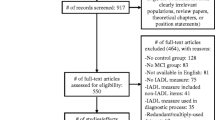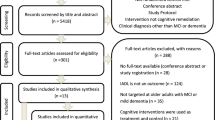Abstract
This systematic review aimed to examine whether higher comorbidity burden, as assessed by comorbidity indices, was associated with a functional autonomy decline in individuals with cognitive impairment. The search was conducted in the following databases: PubMed/MEDLINE, ScienceDirect, Cochrane, and Embase. Both cross-sectional and longitudinal studies that examined the relationship between comorbidity indices and scales measuring activities of daily living (ADL) in individuals with cognitive impairment were included. The quality assessment tool for observational cohort and cross-sectional studies of the National Institutes of Health (NIH) was used. Overall, 12 studies were included, among which three were longitudinal. Significant association was frequently reported by cross-sectional designs (n=7 studies) and only one study reported a significant longitudinal association. This longitudinal study repeatedly assessed both comorbidity burden and functional autonomy, and considered comorbidity burden as a time-varying covariate. Considering comorbidity burden as a time varying covariate may deal with the dynamic nature of comorbidity burden over time, and conducting repeated assessments during the follow-up using both comorbidity index and ADL scales may increase their sensitivity to reliably measure comorbidity burden and functional autonomy decline over time. In conclusion, a higher comorbidity index was associated with a lower level of functional autonomy in people with cognitive impairment. This relationship seems to be dynamic over time and using comorbidity indices and ADL scales only once may not deal with the fluctuation of both comorbidity burden and functional autonomy decline. To cope with complexity of this relationship this review highlights some methodological approaches to be considered.

Similar content being viewed by others
References
The Lancet Public Health. Reinvigorating the public health response to dementia. Lancet Public Health. 2021;6(10):e696. doi:https://doi.org/10.1016/S2468-2667(21)00215-2
Chen TB, Yiao SY, Sun Y, et al. Comorbidity and dementia: A nationwide survey in Taiwan. PLOS ONE. 2017;12(4):e0175475. doi:https://doi.org/10.1371/journal.pone.0175475
Poblador-Plou B, Calderón-Larrañaga A, Marta-Moreno J, et al. Comorbidity of dementia: a cross-sectional study of primary care older patients. BMC Psychiatry. 2014;14:84. doi:https://doi.org/10.1186/1471-244X-14-84
Kao SL, Wang JH, Chen SC, Li YY, Yang YL, Lo RY. Impact of Comorbidity Burden on Cognitive Decline: A Prospective Cohort Study of Older Adults with Dementia. Dement Geriatr Cogn Disord. 2021;50(1):43–50. doi:https://doi.org/10.1159/000514651
Vance D, Larsen KI, Eagerton G, Wright MA. Comorbidities and cognitive functioning: implications for nursing research and practice. J Neurosci Nurs. 2011;43(4):215–224. doi:https://doi.org/10.1097/JNN.0b013e3182212a04
Stuck AE, Walthert JM, Nikolaus T, Büla CJ, Hohmann C, Beck JC. Risk factors for functional status decline in community-living elderly people: a systematic literature review. Social Science & Medicine. 1999;48(4):445–469. doi:https://doi.org/10.1016/S0277-9536(98)00370-0
Falvey JR, Gustavson AM, Price L, Papazian L, Stevens-Lapsley JE. Dementia, Comorbidity, and Physical Function in the Program of All-Inclusive Care for the Elderly. J Geriatr Phys Ther. 2019;42(2):E1–E6. doi:https://doi.org/10.1519/JPT.0000000000000131
Aubert CE, Kabeto M, Kumar N, Wei MY. Multimorbidity and long-term disability and physical functioning decline in middle-aged and older Americans: an observational study. BMC Geriatrics. 2022;22(1):910. doi:https://doi.org/10.1186/s12877-022-03548-9
Buckinx F, Peyrusqué E, Kergoat MJ, Aubertin-Leheudre M. Reference Standard for the Measurement of Loss of Autonomy and Functional Capacities in Long-Term Care Facilities. J Frailty Aging. 2023;12(3):236–243. doi:https://doi.org/10.14283/jfa.2023.4
Slaughter SE, Hayduk LA. Contributions of environment, comorbidity, and stage of dementia to the onset of walking and eating disability in long-term care residents. J Am Geriatr Soc. 2012;60(9):1624–1631. doi:https://doi.org/10.1111/j.1532-5415.2012.04116.x
Nelis SM, Wu YT, Matthews FE, et al. The impact of co-morbidity on the quality of life of people with dementia: findings from the IDEAL study. Age Ageing. 2019;48(3):361–367. doi:https://doi.org/10.1093/ageing/afy155
Tanaka H, Nagata Y, Ishimaru D, Ogawa Y, Fukuhara K, Nishikawa T. Clinical factors associated with activities of daily living and their decline in patients with severe dementia. Psychogeriatrics. 2020;20(3):327–336. doi:https://doi.org/10.1111/psyg.12502
Rozzini R, Frisoni GB, Ferrucci L, et al. Geriatric Index of Comorbidity: validation and comparison with other measures of comorbidity. Age Ageing. 2002;31(4):277–285. doi:https://doi.org/10.1093/ageing/31.4.277
Aslam F, Khan NA. Tools for the Assessment of Comorbidity Burden in Rheumatoid Arthritis. Front Med (Lausanne). 2018;5:39. doi:https://doi.org/10.3389/fmed.2018.00039
Marshall GA, Amariglio RE, Sperling RA, Rentz DM. Activities of daily living: where do they fit in the diagnosis of Alzheimer’s disease? Neurodegener Dis Manag. 2012;2(5):483–491. doi:https://doi.org/10.2217/nmt.12.55
Haaksma ML, Vilela LR, Marengoni A, et al. Comorbidity and progression of late onset Alzheimer’s disease: A systematic review. PLOS ONE. 2017;12(5):e0177044. doi:https://doi.org/10.1371/journal.pone.0177044
Tekin S, Fairbanks LA, O’Connor S, Rosenberg S, Cummings JL. Activities of daily living in Alzheimer’s disease: neuropsychiatric, cognitive, and medical illness influences. Am J Geriatr Psychiatry. 2001;9(1):81–86.
Doraiswamy PM, Leon J, Cummings JL, Marin D, Neumann PJ. Prevalence and impact of medical comorbidity in Alzheimer’s disease. J Gerontol A Biol Sci Med Sci. 2002;57(3):M173–177. doi:https://doi.org/10.1093/gerona/57.3.m173
Oosterveld SM, Kessels RPC, Hamel R, et al. The influence of co-morbidity and frailty on the clinical manifestation of patients with Alzheimer’s disease. J Alzheimers Dis. 2014;42(2):501–509. doi:https://doi.org/10.3233/JAD-140138
Leoutsakos JMS, Han D, Mielke MM, et al. Effects of general medical health on Alzheimer’s progression: the Cache County Dementia Progression Study. Int Psychogeriatr. 2012;24(10):1561–1570. doi:https://doi.org/10.1017/S104161021200049X
Lyketsos CG, Galik E, Steele C, et al. The General Medical Health Rating: a bedside global rating of medical comorbidity in patients with dementia. J Am Geriatr Soc. 1999;47(4):487–491. doi:https://doi.org/10.1111/j.1532-5415.1999.tb07245.x
Solomon A, Dobranici L, Kåreholt I, Tudose C, Lăzărescu M. Comorbidity and the rate of cognitive decline in patients with Alzheimer dementia. Int J Geriatr Psychiatry. 2011;26(12):1244–1251. doi:https://doi.org/10.1002/gps.2670
Melis RJF, Marengoni A, Rizzuto D, et al. The influence of multimorbidity on clinical progression of dementia in a population-based cohort. PLoS One. 2013;8(12):e84014. doi:https://doi.org/10.1371/journal.pone.0084014
PRISMA_update_protocol_20180214.pdf. Published online February 14, 2018. Accessed July 27, 2023. https://osf.io/https://osf.io/2v7mk
Nicholson K, Makovski TT, Griffith LE, Raina P, Stranges S, van den Akker M. Multimorbidity and comorbidity revisited: refining the concepts for international health research. J Clin Epidemiol. 2019;105:142–146. doi:https://doi.org/10.1016/j.jclinepi.2018.09.008
Falagas ME, Pitsouni EI, Malietzis GA, Pappas G. Comparison of PubMed, Scopus, Web of Science, and Google Scholar: strengths and weaknesses. FASEB J. 2008;22(2):338–342. doi:https://doi.org/10.1096/fj.07-9492LSF
Ma LL, Wang YY, Yang ZH, Huang D, Weng H, Zeng XT. Methodological quality (risk of bias) assessment tools for primary and secondary medical studies: what are they and which is better? Military Medical Research. 2020;7(1):7. doi:https://doi.org/10.1186/s40779-020-00238-8
Wubben N, Haaksma M, Ramakers IHGB, et al. A comparison of two approaches for modeling dementia progression in a changing patient context. Int J Geriatr Psychiatry. 2022;37(5). doi:https://doi.org/10.1002/gps.5706
King LA, Priest KC, Nutt J, et al. Comorbidity and functional mobility in persons with Parkinson disease. Arch Phys Med Rehabil. 2014;95(11):2152–2157. doi:https://doi.org/10.1016/j.apmr.2014.07.396
Mariani E, Monastero R, Ercolani S, et al. Influence of comorbidity and cognitive status on instrumental activities of daily living in amnestic mild cognitive impairment: results from the ReGAl project. Int J Geriatr Psychiatry. 2008;23(5):523–530. doi:https://doi.org/10.1002/gps.1932
van Rossum ME, Koek HL. Predictors of functional disability in mild cognitive impairment and dementia. Maturitas. 2016;90:31–36. doi:https://doi.org/10.1016/j.maturitas.2016.05.007
Boltz M, Resnick B, Kuzmik A, et al. Pain Incidence, Treatment, and Associated Symptoms in Hospitalized Persons with Dementia. Pain Manag Nurs. 2021;22(2):158–163. doi:https://doi.org/10.1016/j.pmn.2020.08.002
Samus QM, Mayer L, Onyike CU, et al. Correlates of functional dependence among recently admitted assisted living residents with and without dementia. J Am Med Dir Assoc. 2009;10(5):323–329. doi:https://doi.org/10.1016/j.jamda.2009.01.004
Meghani SH, Buck HG, Dickson VV, et al. The Conceptualization and Measurement of Comorbidity: A Review of the Interprofessional Discourse. Nurs Res Pract. 2013;2013:192782. doi:https://doi.org/10.1155/2013/192782
Wadley VG, Crowe M, Marsiske M, et al. Changes in everyday function among individuals with psychometrically defined Mild Cognitive Impairment in the ACTIVE Study. J Am Geriatr Soc. 2007;55(8):1192–1198. doi:https://doi.org/10.1111/j.1532-5415.2007.01245.x
Quiñones AR, Markwardt S, Thielke S, Rostant O, Vásquez E, Botoseneanu A. Prospective Disability in Different Combinations of Somatic and Mental Multimorbidity. J Gerontol A Biol Sci Med Sci. 2018;73(2):204–210. doi:https://doi.org/10.1093/gerona/glx100
Jiang X, Wang L, Morgenstern LB, Cigolle CT, Claflin ES, Lisabeth LD. New Index for Multiple Chronic Conditions Predicts Functional Outcome in Ischemic Stroke. Neurology. 2021;96(1):e42–e53. doi:https://doi.org/10.1212/WNL.0000000000010992
Zhuang S, Wang HF, Li J, Wang HY, Wang X, Xing CM. Renin-angiotensin system blockade use and risks of cognitive decline and dementia: A meta-analysis. Neurosci Lett. 2016;624:53–61. doi:https://doi.org/10.1016/j.neulet.2016.05.003
Tully PJ, Hanon O, Cosh S, Tzourio C. Diuretic antihypertensive drugs and incident dementia risk: a systematic review, meta-analysis and meta-regression of prospective studies. J Hypertens. 2016;34(6):1027–1035. doi:https://doi.org/10.1097/HJH.0000000000000868
Fox C, Smith T, Maidment I, et al. Effect of medications with anti-cholinergic properties on cognitive function, delirium, physical function and mortality: a systematic review. Age Ageing. 2014;43(5):604–615. doi:https://doi.org/10.1093/ageing/afu096
Liu L, Jia L, Jian P, et al. The Effects of Benzodiazepine Use and Abuse on Cognition in the Elders: A Systematic Review and Meta-Analysis of Comparative Studies. Front Psychiatry. 2020;11:00755. doi:https://doi.org/10.3389/fpsyt.2020.00755
Bunn F, Burn AM, Goodman C, et al. Comorbidity and dementia: a scoping review of the literature. BMC Medicine. 2014;12(1):192. doi:https://doi.org/10.1186/s12916-014-0192-4
Castellanos-Perilla N, Borda MG, Fernández-Quilez Á, Aarsland V, Soennesyn H, Cano-Gutiérrez CA. Factors associated with functional loss among community-dwelling Mexican older adults. Biomedica. 2020;40(3):546–556. doi:https://doi.org/10.7705/biomedica.5380
Gardener EA, Huppert FA, Guralnik JM, Melzer D. Middle-aged and mobility-limited: prevalence of disability and symptom attributions in a national survey. J Gen Intern Med. 2006;21(10):1091–1096. doi:https://doi.org/10.1111/j.1525-1497.2006.00564.x
Valletta M, Vetrano DL, Calderón-Larrañaga A, et al. Association of mild and complex multimorbidity with structural brain changes in older adults: A population-based study. Alzheimers Dement. Published online January 3, 2024. doi:https://doi.org/10.1002/alz.13614
Canaslan K, Ates Bulut E, Kocyigit SE, Aydin AE, Isik AT. Predictivity of the comorbidity indices for geriatric syndromes. BMC Geriatr. 2022;22(1):440. doi:https://doi.org/10.1186/s12877-022-03066-8
Acknowledgements
Mohamed Nour Temedda (PhD student) is supported by “France Médéric d’Alzheimer” (Research scholarship). We thank the Dr Philip Robinson (Hospices Civils de Lyon) for help in manuscript preparation.
Funding
Funding: None.
Author information
Authors and Affiliations
Contributions
Authors’ contributions: Mohamed Nour Temedda: Conceptualization, Methodology, Data analysis, Writing - Original Draft. Antoine Garnier-Crussard: Writing - Review & Editing. Christelle Mouchoux: Conceptualization, Methodology, Analysis, Writing - Original Draft, Supervision. Virginie Dauphinot: Conceptualization, Methodology, Data analysis, Writing - Original Draft, Supervision.
Corresponding author
Ethics declarations
Conflict of Interest: The authors declare no competing interests; this manuscript has not been published or submitted elsewhere. All authors have contributed significantly, and all authors are in agreement with the content of the manuscript.
Ethical standards: Not applicable.
Electronic Supplementary Material
Rights and permissions
About this article
Cite this article
Temedda, M.N., Garnier-Crussard, A., Mouchoux, C. et al. Association between Comorbidity Indices and Functional Autonomy in Individuals with Cognitive Impairment: A Systematic Review. J Prev Alzheimers Dis (2024). https://doi.org/10.14283/jpad.2024.51
Received:
Accepted:
Published:
DOI: https://doi.org/10.14283/jpad.2024.51




